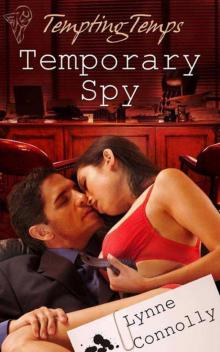- Home
- Lynne Connolly
Lisbon: Richard and Rose, Book 8
Lisbon: Richard and Rose, Book 8 Read online
Dedication
To everyone who followed Richard and Rose through thick and thin, through trouble and happier times, this is for you. Thank you.
Chapter One
October, 1755
A shiver shook me as I stood at the ship’s rail. I wasn’t aware that Richard had noticed until soft fabric slid over my shoulders and touched my forearms. I should have known better. These days, Richard rarely kept his attention far away from me. He was ever alert for signs of fatigue or discomfort, but that made me more aware, more jumpy, not less.
“Thank you.” I didn’t recognise the shawl, a delicate confection of light woollen material in pale blue, lined with silk, embroidered with tiny flowers. I turned my head so our lips were close. “This is lovely. When did you get it?”
“At our last port of call. I saw it in a shop window, and I wanted to see you in it. It said ‘Rose’ to me.” Once he would have kissed me. Now he drew back and smiled, the signs of tension difficult to see. But I knew him too well by now. The tiny lines at the corners of his mouth deepened, freezing the smile in place.
He took his hands away from my forearms, although several layers of fabric lay between my skin and his. Every time he withdrew from my touch, I felt him drawing away from me. Every time he did it, he could do it that much easier, that much more naturally. His eyes held wariness new to us, and something else I shied away from defining, but in my heart I knew to be fear.
Fear that I’d leave him, fear that I’d die. When I’d lain in the throes of childbed fever, he’d watched while I fought for my life, held my hand, pleaded with me to stay with him. If not for him, I might not have come back.
I hated the weakness, and even though months had passed since the physicians had declared my life out of danger, I still felt waves of fatigue, even though I improved every day. More than anything else, I hated the way my husband avoided touching me. He did it now, his fingers barely skimming over the shawl as he withdrew from me.
I turned back to the sea, letting the fresh wind whip away my stinging tears. Tears caused by self-pity, brought on by exhaustion, with a good dash of frustration. I couldn’t pin Richard down to explain or discuss our current dilemma. I’d have more success catching grains of salt. I wanted, more than anything else, for him to hold me while I slept. I wanted the caresses and the kisses that made my days complete. I wanted what we’d had until last July. I wanted my husband back.
I turned back to him and smiled brightly. “We should see the port soon.”
The coast fringed our sight, a low, blue-purple edge to the grey, white-tipped sea. By now I could hardly detect the swells that moved our ship and brought us closer to our destination, hardly hear the slap of the sea against the body of the ship. It didn’t hurt that we occupied one of the most well-equipped vessels in existence. The staterooms were so luxurious they wouldn’t have gone amiss at Versailles.
This situation between us was driving me insane. The politeness and care from everyone, especially Richard, the perfection of everything I touched or handled, the way even the boards beneath my feet on deck were thoroughly sanded and scrubbed every day before I awoke—I wanted some good, old-fashioned real life. I wanted to smell the horse dung in the streets, hear the raucous voices of traders, see a room where the floorboards dipped and shifted from years of honest use. I wanted to smash a glass, destroy a porcelain plate, mar this perfection, but I couldn’t. The yacht didn’t belong to me, and while the owner, my brother-in-law Gervase, wouldn’t object if I destroyed the whole of the grand dining room below, I couldn’t repay his generosity that way. Our frequent stops ashore, ostensibly to explore the places we reached but in reality to rest, had come as a relief to the glorious perfection of the yacht and the way everyone treated me like fragile glass.
“You’re tired. You need to rest.” Richard drew the wrap closer around me, covering my already well-covered bosom, but when I lifted my hand to touch his, to steal just a little of the contact I craved, he moved his hand away, as if he hadn’t seen my gesture. I knew better, but I said nothing. “We won’t arrive in Lisbon for a few hours yet. Plenty of time for you to recruit your strength.”
I couldn’t deny my growing fatigue. “I would perhaps like to go downstairs for an hour.”
“Are you hungry? Would you like to eat something?”
I shook my head. “No.” I’d long tired of the constant pressure to eat and build up my stamina, but I’d lost a lot of weight, so I did my best to regain it. I could no longer indulge in pleasing myself alone. I had children to care for now.
I took his arm when he held it out to me, enjoying the feel of his hard muscles under the green wool of his coat. It was the nearest I’d been to touching him for some time. I took anything I could get these days, a beggar for contact with him.
I descended the steep stairwell below as if born to it. At first I’d found negotiating the yacht difficult, but I’d accustomed myself to the stairs, just as I’d grown used to the gentle but constant movements under my feet. The white-painted corridor led to a series of staterooms, and the gentle sound of a child’s laughter drifted out to us as we approached. Our daughter, Helen, every day growing more enchanting. I would visit her later. And our other children, still babes in arms, who did not yet recognise me as their mother, but they would, in time.
Richard opened the door and ushered me into a spacious stateroom, which I occupied on my own. Before my illness Richard and I had never spent a night apart. Now we never spent a night together.
“Shall I send Nichols to you?”
Defiance shot through me. Why should I be the only one suffering? “No, thank you. You can help. You always said you knew your way around a lady’s garments better than any maid.” I smiled but received none in answer. Only a still watchfulness, his classical features set in an expression of repose. I tossed my new shawl on a chair. “If you could just help loosen my stays at the back, I’ll be perfectly comfortable.”
I unhooked my gown at the front, let it slide off my shoulders and fall to the floor. All I could feel behind me was a hot breath on my nearly bare shoulder. Just one breath. He stepped back.
I hoped the restraint was hurting him as much as it hurt me. After all, these days it wasn’t of my doing. I waited, and then felt his fingers on the strings of my stays. Hard, viciously ripping at the laces, as if he wanted to get the task over with as fast as possible. When he touched my skin, his fingers skimmed past the stays to linger on my shoulder blades, and I revelled in his touch, however slight. He sucked in a deep breath, his gasp harsh in the near silence of the stateroom.
I wouldn’t tell him I could have done it myself. These stays hooked down the front, the back laced to fit me. My maid Nichols would curse when she found the laces undone. She would just have to put up with it. I wanted to force him back into some kind of intimacy. Surely he couldn’t keep this distance up for much longer.
I turned back and smiled, keeping it friendly. A sultry invitation would have him running. “Thank you.”
He spun around and dragged down the covers on the bed. The scent of lavender from the sheets wreathed around us. I’d come to associate that aroma with closeness. It perfumed our sheets, my private linens, and warmed from body heat, escaped when we undressed. But that was before my illness. Now it meant loneliness and solitude.
I loosened the outer petticoat and the quilted one I’d chosen to wear that day in place of panniers, leaving me in my stays, shift and under-petticoat. Then I kicked off my shoes. That should be enough to tempt him. My breasts were more exposed than hidden, my arms bare, the shape of my body easily visible.
Not that I expected it now, but constant repetition of this scene would weak
en his resolve. I would not lose the battle to recommence the intimacy that had made both of us so happy such a short time before.
He forced a smile and glanced at the bed. “In you get. I’ll have Nichols wake you in two hours.”
I climbed in, trying to tempt without being obviously provocative. He tossed the sheets over me and left without a backward glance, without bending to kiss me. He hardly looked at me. I dashed away incipient tears and set myself to my repose. Although I didn’t really need it anymore, I would take all the respite I required to ready myself for the fight ahead. The fight to get my husband back in my bed.
That same evening, we arrived in Lisbon. Wearing my new shawl over a blue silk gown that almost matched it for colour, I stood at the rail once more and watched the city as it came into view.
I had studied it on the map, and it appeared at first sight that Lisbon was the same size as Liverpool, a rapidly growing port in England. Lisbon, however, had a grace and stateliness that engravings of Liverpool told me it did not possess. Churches and towers of great buildings dominated the view here, but I couldn’t tell which was palace and which cathedral at this stage. I knew both bordered the sea, presenting an impression of wealth and power.
As we drew closer, I saw that the architecture had an appearance the like of which I hadn’t encountered anywhere else. Although I had visited Venice, Paris and other great cities, I had seen nothing like Lisbon. I couldn’t quite understand why, and I concentrated on the view to see if I could discern what the difference consisted of. Small rounded towers, some bulbous shapes resembling nothing so much as an onion, some bearing the remains of bright paint. Several buildings gleamed in the sun, colours shining, and I guessed they were decorated with the colourful tiles Portugal was famous for. The exotic mixed in with the mundane.
Some seagoing ships, sails folded away for the stay in port, and other, smaller vessels, bobbed in the tide, the smaller courting the larger like maids-in-waiting. All the small vessels seemed to be heading for us. Our captain would have sent word of our imminent arrival, to bespeak our berth at the port, but I didn’t imagine it would create this kind of fuss. We were personages of some importance, but not that much, surely. Lisbon was a fashionable place to avoid the rigours of the English winters and had many an aristocratic visitor, so we wouldn’t be unusual.
Our ship creaked to a near halt, and the gentle sway of the waves against the planking grew more pronounced.
Richard walked over to join me. He brought the captain with him, an efficient man with many years at sea under his belt.
“Why are all these little vessels heading for us? Do we disembark on them? I thought we had planned to do that tomorrow?” For sunset was bathing the horizon in gold, and it seemed easier to sleep in the staterooms tonight, rather than go ashore.
The captain gave me his answer. “Some passengers do use the boats, my lady, but it’s not that. I’m afraid we have to suffer visits from officials before we’re allowed to disembark. They wish to assure themselves that we are healthy and are not smuggling undesirables.”
I exchanged a glance with Richard and saw his brief smile.
“You told them who we were and where we are headed, I presume?” Richard asked.
“Yes indeed, my lord. I dispatched a messenger as soon as we were close enough for him to row to shore. I believe that increased their eagerness to ensure that everything was done properly.”
I laid my hand on Richard’s sleeve, and then withdrew it hastily. Now was not the time to put more pressure on him in our own, personal conflict. “I believe he means that they wish to see us for themselves.”
Richard gave a cold smile, and I knew he sensed himself under threat. The more he felt unsure or endangered, the further he retreated behind the cold mask he had used all the time until we had met. “We are in the nature of a play for them, a rarée show of some kind?”
The captain reddened and glanced away. He should have dealt with this eventuality before now, and he knew it, or at least prepared for it. “We must allow a pilot on board, my lord. He will guide us into harbour. That is usual in any port.” It was telling that he reverted to Richard’s formal address, not the “sir” he’d been using throughout the voyage.
“What isn’t usual?” Richard demanded immediately.
“More officials.” The captain sighed. “Indeed, my lord, I apologise for the delay, but I have been informed in no uncertain terms that we must undergo the formality of an inspection before we leave the yacht for shore. Doubtless others will seize the opportunity to see as much as they can of such a fine vessel as this one.”
“You may tell them that we will accept their presence in the morning. I will not allow them on board until then. Send them back.”
The captain touched his forehead with two fingers in an informal salute. “But, my lord, they are waiting to embark.”
“Let them wait.” He turned away, the conversation obviously done.
The captain made a gesture of helplessness to the officials in the boats. Several lights glinted off the telescopes some were holding, so they could see his action perfectly well. He snapped out an order, and a man scurried to the rear of the vessel to send a message by using that intriguing combination of flags and gestures.
I watched as the man sent the message and someone in the boat waved wildly back. The response didn’t appear as controlled. More furiously angry.
Smiling, I went below to join my husband for dinner. Very few people got the better of him.
After another night aboard spent in my lonely bed, I dressed, ate and visited my children before going back up on deck to discover if the small boats had reappeared.
Richard was already there. It was the first time I’d seen him that day. He studied me, searching, I knew, for signs of strain, but I had perfected my veneer of serenity since my illness, and I was sure he could see nothing untoward. In truth, I was longing to see my sister, and I wanted nothing to get in the way of that today. In her last letter to me, she said she would try to meet us at the pier, but she could not promise it. We had sent word, but she didn’t usually reside in the city, rather, in her house a few miles distant.
I saw the hard edge to Richard’s expression, the firm line of his mouth, and knew he was thinking of the safety of me and our children. We still had enemies, despite defeating two of them last year. Every great lord had adversaries, but because of family matters and Richard’s zeal to further the cause of justice, we had more than most.
Richard appeared smooth, in control on the surface. He had dressed up for our visitors. On board, he had been at his most informal, preferring country coats and plain materials, often leaving off his formal wig to bare his golden hair to the sun, but today he had returned to being the leader of fashion, and he appeared at his daunting best.
Magnificent only began to describe his appearance. He looked formidable, in full command of his destiny, and for that matter, ours too.
He’d chosen to wear his favourite colour that matched the hue of his eyes. His clothes were laced with silver that glinted in the bright sunshine; he could challenge the King of Portugal himself for magnificence. The large faceted silver buttons on his coat flashed, echoing the ones on the hilt of his dress sword, which I knew for sure were real, all adorned with the Kerre family coat of arms. He’d applied some powder to his face, and a tiny black patch teased the corner of his left eye. He would cow the officials into allowing us a speedy passage into port today.
I would not even attempt to compete with Richard in his peacock glory, but I had dressed more formally than had been my wont recently. I wore my blue silk gown over a silver-grey petticoat, with blue ribbons in my hat and pearls around my neck and wrists.
My gloves were of fine kid, pure and clean, the kind I would have preserved carefully in my Devonshire days, but now I discarded them when I considered them worn. Sometimes I smiled at the grand lady I’d become, but I’d never lost sight of the reserved, practical daughter of the gentry. Richard u
sed to say he loved them both and adored the differences, but he hadn’t said that in a while.
Three rowboats approached the yacht. There must have been eighteen people aboard those small boats, if not more. It made interesting viewing, and when they came close enough, I could see how full they were, men jockeying for places, the wide skirts of their coats crushed between their bodies.
Next to me, Richard murmured, “I’ll do my best to get rid of them. I have the stairs blocked so they will not get to the children without our permission.”
“Good. By your dress, you could wear that coat at court.”
“They want a show. I could do nothing but oblige.”
I laughed, and some of the reserve between us melted. I could see it in his eyes as his expression softened.
But we weren’t alone, and we didn’t have the chance of being alone again for some time. In the company of other people, he would feel safer because he knew I couldn’t show him the fondness I felt for him in more than conventional ways. I couldn’t try to seduce him, undress for him or share intimacies.
However, he had unbent somewhat from the cold, restrained man who greeted me on my return to sanity after the fever broke. He no longer conducted himself like some kind of animated marble statue, but he was still far from accepting effusive displays of affection in public. I would take what I could while I could and be pathetically grateful for it. It would help to sustain me in the battle ahead. For it was a battle and would continue to be so until I had him back in my bed.
A middle-aged man led the way aboard, concentrating on his steps up the rickety rope ladder to the yacht, so he didn’t look up until he had both feet planted on the wooden deck. Just as well really, because he nearly tumbled over the side when he lifted his eyes and saw Richard.
Totally in his element, Richard raised a brow, the rest of his face still and waiting. The man stuttered something, and one of the men with him murmured, in English, “The pilot, your excellence.”
“Your lordship.” Richard’s valet and general factotum, Carier, had unobtrusively arrived on deck and stood between the pilot and my husband. “You address him as ‘your lordship’.”

 Boundless (The Shaws)
Boundless (The Shaws) Sinless (The Shaws)
Sinless (The Shaws) The Girl with the Pearl Pin
The Girl with the Pearl Pin Hosts to Ghosts Box Set
Hosts to Ghosts Box Set The Making of a Marquess
The Making of a Marquess Boundless
Boundless Beauty of Sunset
Beauty of Sunset Virginia And The Wolf
Virginia And The Wolf Department 57: Bloody Crystal
Department 57: Bloody Crystal Temptation Has Green Eyes
Temptation Has Green Eyes Forged by Love: Even Gods Fall in Love, Book 4
Forged by Love: Even Gods Fall in Love, Book 4 IntheMood
IntheMood Hareton Hall: Richard and Rose, Book 6
Hareton Hall: Richard and Rose, Book 6 ShiftingHeat
ShiftingHeat Rendezvous at Midnight
Rendezvous at Midnight Yorkshire: Richard and Rose, Book 1
Yorkshire: Richard and Rose, Book 1 Lisbon: Richard and Rose, Book 8
Lisbon: Richard and Rose, Book 8 Devonshire: Richard and Rose, Book 2
Devonshire: Richard and Rose, Book 2 Venice
Venice War Chest: Even Gods Fall in Love, Book 5
War Chest: Even Gods Fall in Love, Book 5 Dilemma in Yellow Silk (Emperors of London)
Dilemma in Yellow Silk (Emperors of London) BornontheBayou
BornontheBayou Dauntless (The Shaws)
Dauntless (The Shaws) Brutally Beautiful
Brutally Beautiful Lightning Unbound: Even Gods Fall in Love, Book 1
Lightning Unbound: Even Gods Fall in Love, Book 1 FascinatingRhythm
FascinatingRhythm Fearless
Fearless A Chance to Dream
A Chance to Dream Mad for Love: Even Gods Fall in Love, Book 2
Mad for Love: Even Gods Fall in Love, Book 2 Sinless
Sinless SailtotheMoon
SailtotheMoon Wild Lavender
Wild Lavender Department 57: Rubies of Fire
Department 57: Rubies of Fire Maiden Lane
Maiden Lane Harley Street
Harley Street Dauntless
Dauntless NicenEasy
NicenEasy It Started at Waterloo
It Started at Waterloo Temporary Spy
Temporary Spy BorntobeWild
BorntobeWild Dilemma in Yellow Silk
Dilemma in Yellow Silk Yorkshire
Yorkshire The Thorndykes 1: Dispossessed
The Thorndykes 1: Dispossessed The Thorndyke Trilogy 2: Dancing at Midnight
The Thorndyke Trilogy 2: Dancing at Midnight Learning to Trust
Learning to Trust Her Quicksilver Lover: Even Gods Fall in Love, Book 6
Her Quicksilver Lover: Even Gods Fall in Love, Book 6 Loving Lucy
Loving Lucy Irresistible You
Irresistible You Arrows of Desire: Even Gods Fall in Love, Book 3
Arrows of Desire: Even Gods Fall in Love, Book 3 Unbroken
Unbroken Devonshire
Devonshire Reckless in Pink
Reckless in Pink Rogue in Red Velvet
Rogue in Red Velvet